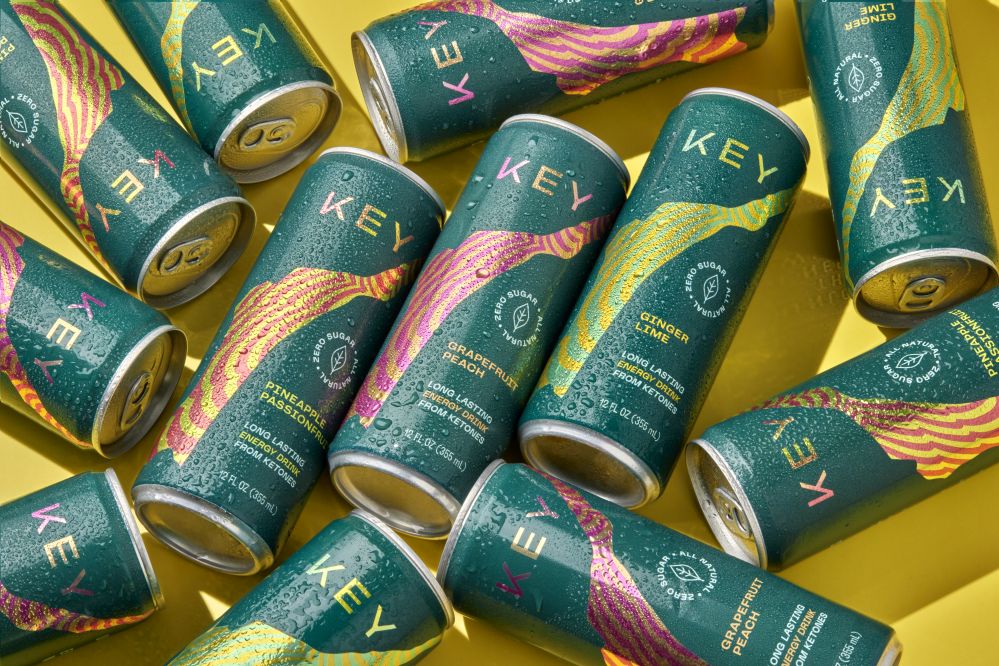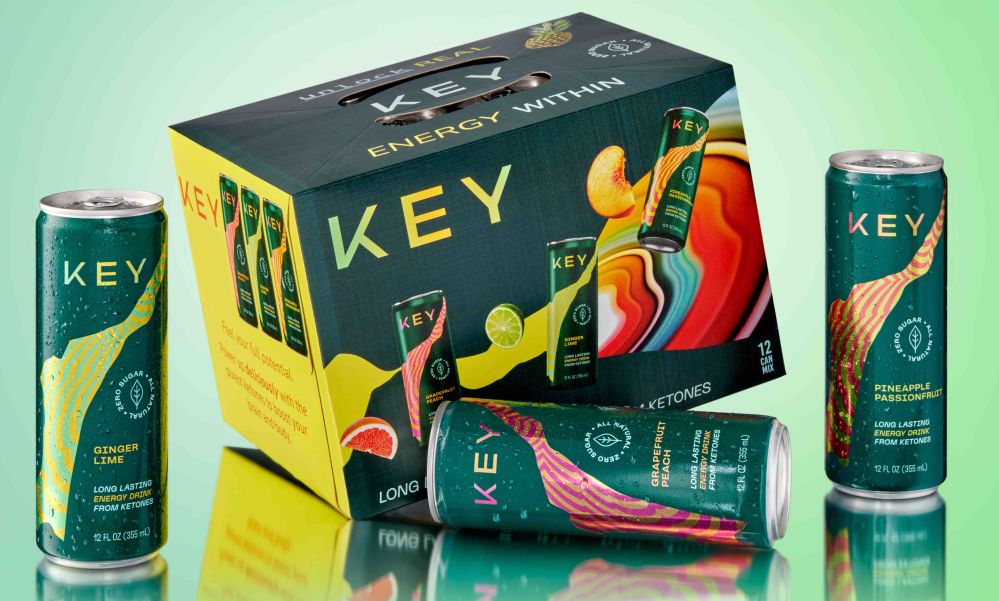[Disclosure: AgFunderNews’ parent company AgFunder is an investor in KEY.]
KEY—a startup led by former PepsiCo and Coca-Cola execs on a mission to disrupt the US functional beverage segment with a zero-sugar ketone-fueled energy drink—has emerged from stealth armed with $4 million in seed funding.
The round, led by AgFunder and backed by Alethia Venture Partners and AgFunder SIJ Impact Fund, will support retail distribution, inventory and marketing efforts at the firm, which is launching direct-to-consumer and on Amazon, and making its retail debut at Erewhon in southern California and select retailers in New York.
Developed by Karishma Thawani (who worked in procurement at Coca-Cola) and Dr. Tekla Back (who spent seven years at PepsiCo in corporate strategy), KEY is a zero-sugar energy drink sweetened with stevia, featuring 80mg caffeine from green tea, coupled with l-theanine, an amino acid also found in green tea that is often paired with caffeine for improved focus.
However, the star ingredient is Avela [R] 1,3-butanediol [listed as ‘pre-ketones’ on pack], an organic compound that can be converted to D-BHB, one of three ketones produced by the liver to provide energy when the body is fasting or in ketosis (burning fat for energy rather than glucose).
KEY sources this branded ingredient (Avela) from bioengineering firm Genomatica, which says the ‘R’ form of 1,3-butanediol—which it produces via microbial fermentation—is effective at raising BHB levels and generating ‘on-demand ketosis’ within 30 minutes of ingestion.
Launched in the US in late 2022 as an ingredient for functional foods and beverages, Avela is self-GRAS (Generally Recognized as Safe) although Genomatica has not yet secured a ‘no questions’ letter from the Food and Drug Administration, Tekla Back told AgFunderNews.
Notably, she said, the Avela ingredient—a clear, colorless, hygroscopic liquid—can be included in beverages at a meaningful dose without breaking the bank or creating sensory problems, a major challenge for companies attempting to formulate with ketones.

‘Compared with esters, we taste delicious and are affordable’
Right now, there are three standard options for formulators looking to add ketones to their wares, she said: “MCT oils have low efficiency—it’s hard to consume enough to elevate your blood BHB levels—and they come with some unfortunate [gastrointestinal] side effects for some people. Then there are ketone salts, which are super salty at high doses and don’t do much at low doses. And finally there are ketone esters, which are much better, but super pricey and taste like battery acid.
“Compared with esters, we taste delicious and are affordable, and because we have 11.5g pre-ketones per can, we can have a meaningful effect without causing gastro issues. We’re unlocking an alternative source of energy from ketones instead of a spike followed by a crash, which is what you get with a lot of energy drinks now, which are cutting the sugar but adding huge amounts of caffeine.”
According to Genomatica, while Avela “can have a bitter taste when tasted neat or in formulations that do not account for its strong flavor,” flavor maskers such as MycoTechnology’s Clear IQ flavor modulator/bitter blocker can neutralize it.
‘Keto is hard for most people’
Back—who has been running a keto snacks business called KEHO since 2017—noted that maintaining a state of ketosis by following a high-fat, moderate protein and ultra-low carb diet is extremely hard to sustain, prompting interest in ‘exogenous’ ketones, which are added to the diet rather than produced by the liver.
“Keto is hard for most people, so it was a case of how do you bring the benefits to everyone in a way that’s affordable and accessible?” said Back, who has been working on KEY with Thawani in stealth mode for a couple of years. “When we started looking at exogenous ketones, they were very expensive and so the big unlock is using fermentation to make [precursors to] ketones, which is helping bring the price down.”
While other food and beverage formulators have access to Avela (R)-1,3-Butanediol, which is used in sports drinks and products such as KetoneIQ and Kenetik, she said, KEY is a lifestyle brand aimed squarely at the mainstream.
“We truly believe that ketones are the new protein; so the presence of ketones won’t be a differentiator ultimately; but rather the brand and product concept,” she stressed.
“I also think we’re the only ones to have really cracked the taste and that’s where I think some of the knowledge we have from beverages allowed us to get the formulation right.”
But she added: “I think we can still do better and we’ve already formulated two new SKUs that will be launched later this year where we’re using combination of monk fruit and stevia [which can be bitter as a standalone sweetener].”
For the packaging, KEY takes “cues from existing energy drinks, leading with green for naturalness,” while the “flash or crack on the can is a nod to electricity and potential,” said Back, who noted that KEY has a Nutrition Facts label (positioning it as a beverage) while some other players in this space have supplements facts panels (positioning them as dietary supplements).
Manual Gonzalez, partner at AgFunder, said KEY was branded for a demographic similar to that of Celsius (one of the most successful energy drinks of the last decade), and tapped into consumers’ desire for natural, sustained energy without sugar, with a short, clean-label ingredients list and founders that understood the markets they were operating in.
“More than anything, Tekla and Karishma are the embodiment of founder-market-fit.”

‘I got chills when we found this ingredient’
Stepping back to look at the functional beverages market, Back said: “I got chills when we found this ingredient because when I used to work at PepsiCo what we were searching for was long lasting natural energy, and that’s what this gives you.
“But our goal is not to compete in a narrow keto drinks category, this is an energy drink. Sugar-free energy drinks is the fastest growing, highest margin segment of the market and the least consolidated by the majors.”
Asked if she was surprised Pepsi and Coca-Cola hadn’t got into the ketone beverage space (although Nestlé Health Sciences has dipped its toes in the water with a supplement), she said: “I think it’s still too new and uncertain without the FDA GRAS approval yet, but my hunch is they’re going to look to buy once a brand has demonstrated market fit at scale.”
Ketones for energy
While Genomatica has a published study (which it funded) showing Avela raises BHB levels in the blood, is there much evidence to show elevated BHB levels can deliver some of the other benefits claimed by players in the space?
According to Back: “There’s a lot of misinformation out there on ketones and what’s really important is that the benefits are dose dependent, so some of the benefits that have been shown on things like endurance and recovery require extremely high doses. But in the simplest terms, the fact that ketones provide energy is indisputable. They have more calories per gram than sugar (one can of KEY containing 11.5g Avela pre-ketones has 79 calories – equating to 6.9 cals/g/ketones vs 4 cals/g/sugar), so starting with energy is the safest bet.”
The key to KEY, she added, is that the energy from ketones is different to that provided by sugar, which provides a quick boost of energy that rapidly dissipates, whereas ketones hang around in the bloodstream for far longer. “The difference is that the energy levels remain truly elevated vs sugar or caffeine.”
She added: “Ketones research is really just starting, but my expectation is that over the next five years, there’s going to be a lot more opportunity to demonstrate benefits beyond energy.”
Asked why KEY is including caffeine in the first wave of products, she said: “The caffeine is there to give you a boost as the ketones take a little bit of time to kick in. The caffeine gets you up and the ketones keep you going. Adding the l-theanine and caffeine from green tea in the right ratio also helps provide mental focus.”
The go to market strategy
So who is the target consumer and what’s the go to market strategy?
Back explained: “We did a consumer study with 2,000 people, which is not typical for a startup, but I’d say our target consumer is marginally more male than female and is an existing energy drink drinker that wants something more natural, and sugar free, but is OK with a certain number of calories and with ketones. And we’re talking about 16% of energy drinkers, and that’s a $3 billion market.”
That said, launching a new beverage is not for the faint-hearted, she acknowledged. “It’s arguably one of the highest marketing spend categories out there because it’s such a branded market. Beverages are also heavy to ship, and distribution for direct store delivery is pretty locked up.
“So our strategy is really to build out by region to make sure we get great velocities, so we’re super focused on our initial two markets: L.A. and New York. I’d say we’re combining the best of what we know about old school, street fighting retail rollouts, and what we also know about direct-to-consumer brand building.”
She added: “And this is where some of our experience and knowledge in the space really helps because Karishma knows the bottling side and the distribution side inside out and I know the retail side and have some existing contacts. So we were really lucky to get into Erewhon, and we’re already with [distributor] KeHE pre-launch, which is wild.”
As for the direct-to-consumer business, she said, “Depending on the repeat rate, it absolutely can make money. We spent a lot of time on our product economics and making sure we started at the right scale so that we ultimately could. We’ve also been through many 3PLs/Amazon math scenarios, so we’ll see what happens, but our sense is, we won’t necessarily make money on the first purchase, but if the repeat rate is high enough, yes.”
Thawani added: “We wanted to go direct-to-consumer because we can educate consumers on ketones and the product. We’re going to do a lot of retail marketing, but a lot of education will come from our website. So initially, our revenue will be slightly more online, through our own website and Amazon, but we will be more retail revenue led after year one or two.”
KEY is being manufactured by a “copacker in the Midwest that buys the more common ingredients such as stevia at scale, which helped with our unit economics,” she explained.
“We did our first production run with about 200,000 cans, and we’re going to do another run two times that size later this year.”
“When I saw KEY, I thought, this is not possible, all-natural, no sugar, and low caffeine… how can this be? Well, it so happens that ketones activate our own body’s ability to make energy. Ketones and green tea are my new mantra. But more than anything, Tekla and Karishma are the embodiment of founder market fit. Every time I talk to them, I like this company better, and every time I drink a KEY, I feel the long-lasting energy, and when I read the simplicity of the label, I see a great company in the making.” Manuel Gonzalez, general partner, AgFunder
Incremental growth for the energy drinks category?
Asked about funding, Thawani said: “It’s a very difficult environment to fundraise pre-revenue, but I think what worked for us and where it started to click was as soon as we were able to get into Erewhon.”
As for scaling up the core ingredient, Back said: “We have a very robust supply agreement with them [Genomatica] and they are committed to supplying what we need to scale up.”
While KEY expects to attract existing energy drink consumers looking for a better option, it also expects to attract consumers that are not regular drinkers, Thawani added: “The goal here is to increase the energy drink market. Based on our consumer research, a lot of people are hesitant to try energy drinks, because of the long list of ingredients and the high caffeine.
“In some ways, KEY is kind of like the old school energy drinks, which had a lot of sugar and a little bit of caffeine. But what we’re doing is taking out the sugar and replacing it with ketones, which are a better source of energy.”





